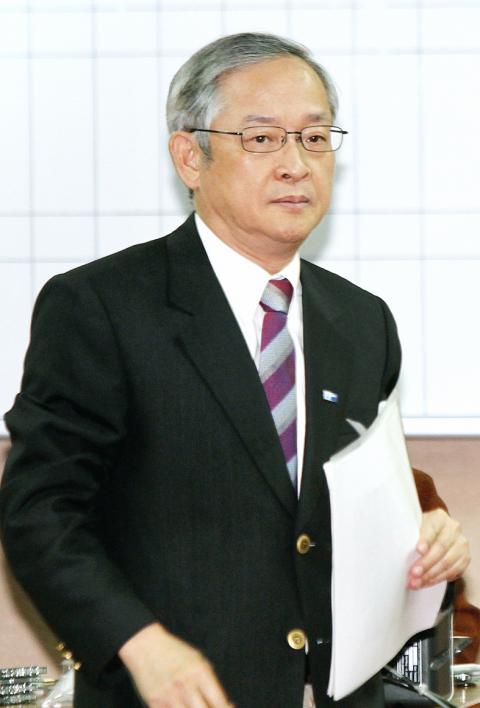During deliberations on nuclear energy issues at the legislature yesterday, Chinese Nationalist Party (KMT) Legislator Lin Yu-fang (林郁方) risked a diplomatic flap when he said Japan had mishandled the Fukushima Dai-ichi nuclear power plant disaster because the Japanese are “stupid.”
Speaking at a legislative committee session, Lin said: “Taiwanese have an appalling affection, they worship everything about Japan.”
“They believe if Japanese cannot do it, then Taiwanese also cannot do it. Their emotions remain in the colonial era,” he added.

Photo: Chien Jung-fong, Taipei Times
“I see that Japanese people are very stupid,” he said.
“It is because they are so stubborn and rigid in their thinking that the Fukushima plant became such a big disaster,” he added.
“The Fukushima disaster could have been prevented in other countries around the world. All you needed to do was pour water on it and that would have solved the problem,” Lin said.
His remarks came during a meeting of the legislature’s Foreign Affairs and National Defense Committee, which had officials tabling reports made by other countries and international organizations, discussing Taiwan’s operation of nuclear plants and disaster response measures in the event of an accident.
Following the controversial comments, Democratic Progressive Party (DPP) Legislator Chiu Chih-wei (邱志偉) denounced Lin.
“Japan is one of Taiwan’s allies, yet a ruling party legislator uses such deliberate insults to disparage the people of another nation. I feel bad about this,” Chiu said.
“Lin Yu-fang is a veteran lawmaker with long experience in foreign affairs. How can he malign the people of a neighboring country?” Chiu added.
Chiu asked Minister of Foreign Affairs David Lin (林永樂): “If the same thing were to happen in Japan, like a Japanese Diet member saying Taiwanese are very stupid and are despicable people, how would you react to it? Would it not affect the Taiwan-Japan relationship?”
Lin said that Taiwan and Japan have a close relationship, and that the government would continue to enhance bilateral cooperation in many fields.

MAKING WAVES: China’s maritime militia could become a nontraditional threat in war, clogging up shipping lanes to prevent US or Japanese intervention, a report said About 1,900 Chinese ships flying flags of convenience and fishing vessels that participated in China’s military exercises around Taiwan last month and in January last year have been listed for monitoring, Coast Guard Administration (CGA) Deputy Director-General Hsieh Ching-chin (謝慶欽) said yesterday. Following amendments to the Commercial Port Act (商港法) and the Law of Ships (船舶法) last month, the CGA can designate possible berthing areas or deny ports of call for vessels suspected of loitering around areas where undersea cables can be accessed, Oceans Affairs Council Minister Kuan Bi-ling (管碧玲) said. The list of suspected ships, originally 300, had risen to about

DAREDEVIL: Honnold said it had always been a dream of his to climb Taipei 101, while a Netflix producer said the skyscraper was ‘a real icon of this country’ US climber Alex Honnold yesterday took on Taiwan’s tallest building, becoming the first person to scale Taipei 101 without a rope, harness or safety net. Hundreds of spectators gathered at the base of the 101-story skyscraper to watch Honnold, 40, embark on his daredevil feat, which was also broadcast live on Netflix. Dressed in a red T-shirt and yellow custom-made climbing shoes, Honnold swiftly moved up the southeast face of the glass and steel building. At one point, he stepped onto a platform midway up to wave down at fans and onlookers who were taking photos. People watching from inside

Japan’s strategic alliance with the US would collapse if Tokyo were to turn away from a conflict in Taiwan, Japanese Prime Minister Sanae Takaichi said yesterday, but distanced herself from previous comments that suggested a possible military response in such an event. Takaichi expressed her latest views on a nationally broadcast TV program late on Monday, where an opposition party leader criticized her for igniting tensions with China with the earlier remarks. Ties between Japan and China have sunk to the worst level in years after Takaichi said in November that a hypothetical Chinese attack on Taiwan could bring about a Japanese

The WHO ignored early COVID-19 warnings from Taiwan, US Deputy Secretary of Health and Human Services Jim O’Neill said on Friday, as part of justification for Washington withdrawing from the global health body. US Secretary of State Marco Rubio on Thursday said that the US was pulling out of the UN agency, as it failed to fulfill its responsibilities during the COVID-19 pandemic. The WHO “ignored early COVID warnings from Taiwan in 2019 by pretending Taiwan did not exist, O’Neill wrote on X on Friday, Taiwan time. “It ignored rigorous science and promoted lockdowns.” The US will “continue international coordination on infectious